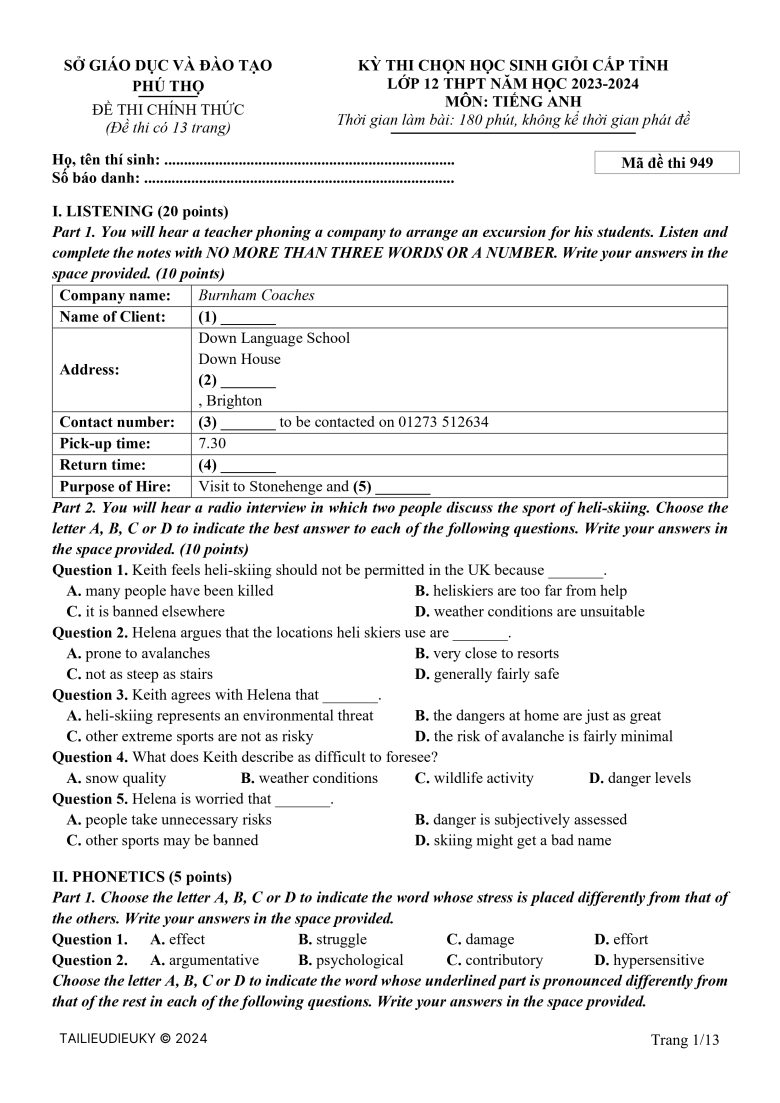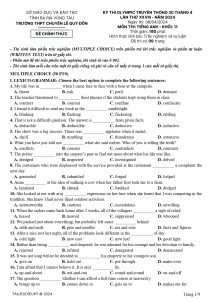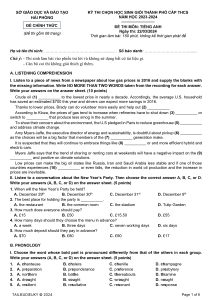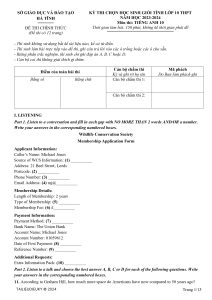Đề thi HSG Tiếng Anh 12 tỉnh Phú Thọ năm học 2023-2024 có đáp án và file nghe đã được cập nhật tại website Tài liệu diệu kỳ. Đề thi chính thức gồm 13 trang, bao gồm cả trắc nghiệm và tự luận. Kết quả chính thức sẽ được Sở GD&ĐT Phú Thọ công bố vào cuối tháng 1 năm 2024.
Theo thông tin chính thức từ Sở Giáo dục tỉnh, Kỳ thi chọn học sinh giỏi cấp tỉnh lớp 12 THPT năm học 2023-2024 có 2.134 học sinh của 45 đơn vị đăng ký dự thi trong toàn tỉnh tham gia với 10 môn thi: Toán, Vật lí, Hóa học, Sinh học, Tin học, Ngữ văn, Lịch sử, Địa lý, Tiếng Anh, và Giáo dục công dân.
Tổng quan Đề thi HSG Tiếng Anh 12 tỉnh Phú Thọ năm học 2023-2024:
- I. Listening (2 điểm):
Part 1: Students complete notes based on a phone call arranging a student excursion, focusing on details like company name, contact information, and trip purpose.
Part 2: Candidates listen to a radio interview discussing heli-skiing, answering multiple-choice questions about safety, environmental impact, and regulations.
- II. Phonetics (0,5 điểm)
In the phonetics section, candidates identify words with stress placed differently and words with differently pronounced underlined parts.
- III. Lexico and Grammar (5 điểm)
The Lexico-Grammar section requires candidates to select the correct word or phrase to complete sentences or correct errors in given sentences. The questions in this section address vocabulary, grammar, and precise language usage.
- IV. Language function (0,5 điểm)
This section requires candidates to choose the most suitable response to complete each given conversation
- IV. Language function (0,5 điểm)
Open cloze test, Reading comprehenstion test and summary completion.
- V. Writing (6 điểm)
Sentence Equivalence: Choose matching sentences.; Sentence Combination: Combine sentences effectively.; Sentence Transformation: Rewrite sentences. ; Sentence Rewriting: Rewrite without altering word forms. ; Essay Writing: Discuss teaching recycling at home versus school.
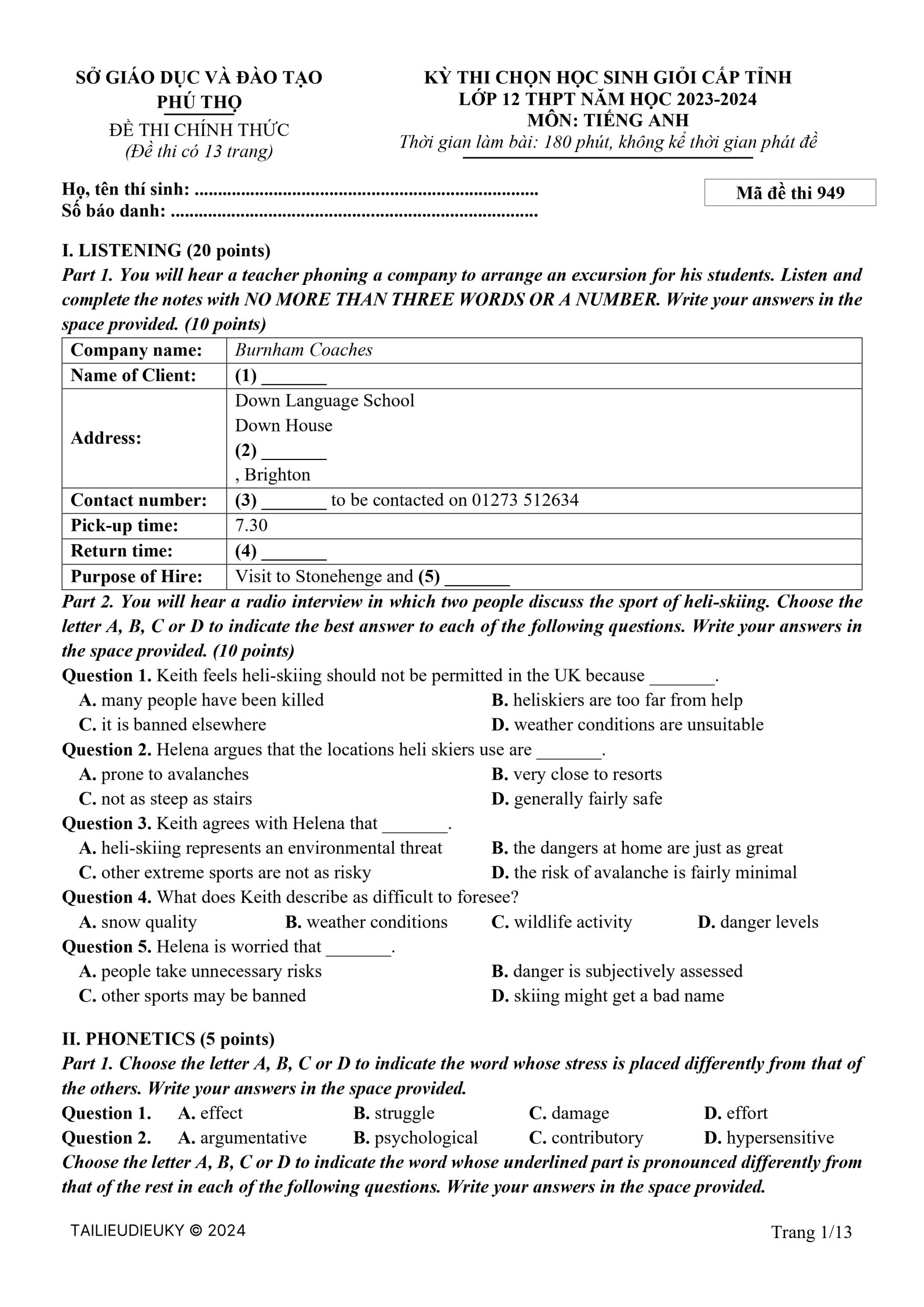
Đề thi HSG Tiếng Anh 12 tỉnh Phú Thọ năm học 2023-2024 - Trang 1
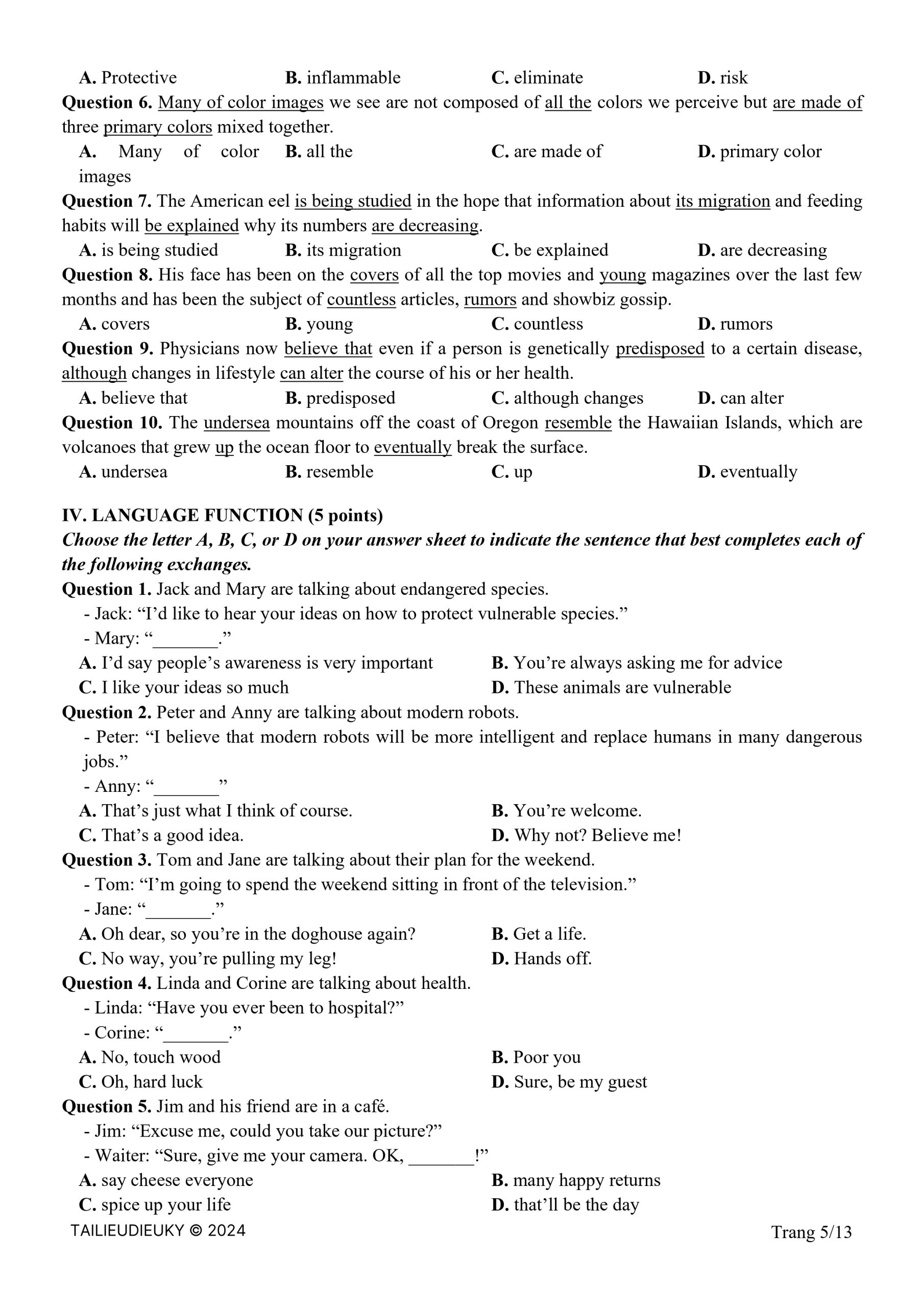
Đề thi HSG Tiếng Anh 12 tỉnh Phú Thọ năm học 2023-2024 - Trang 5
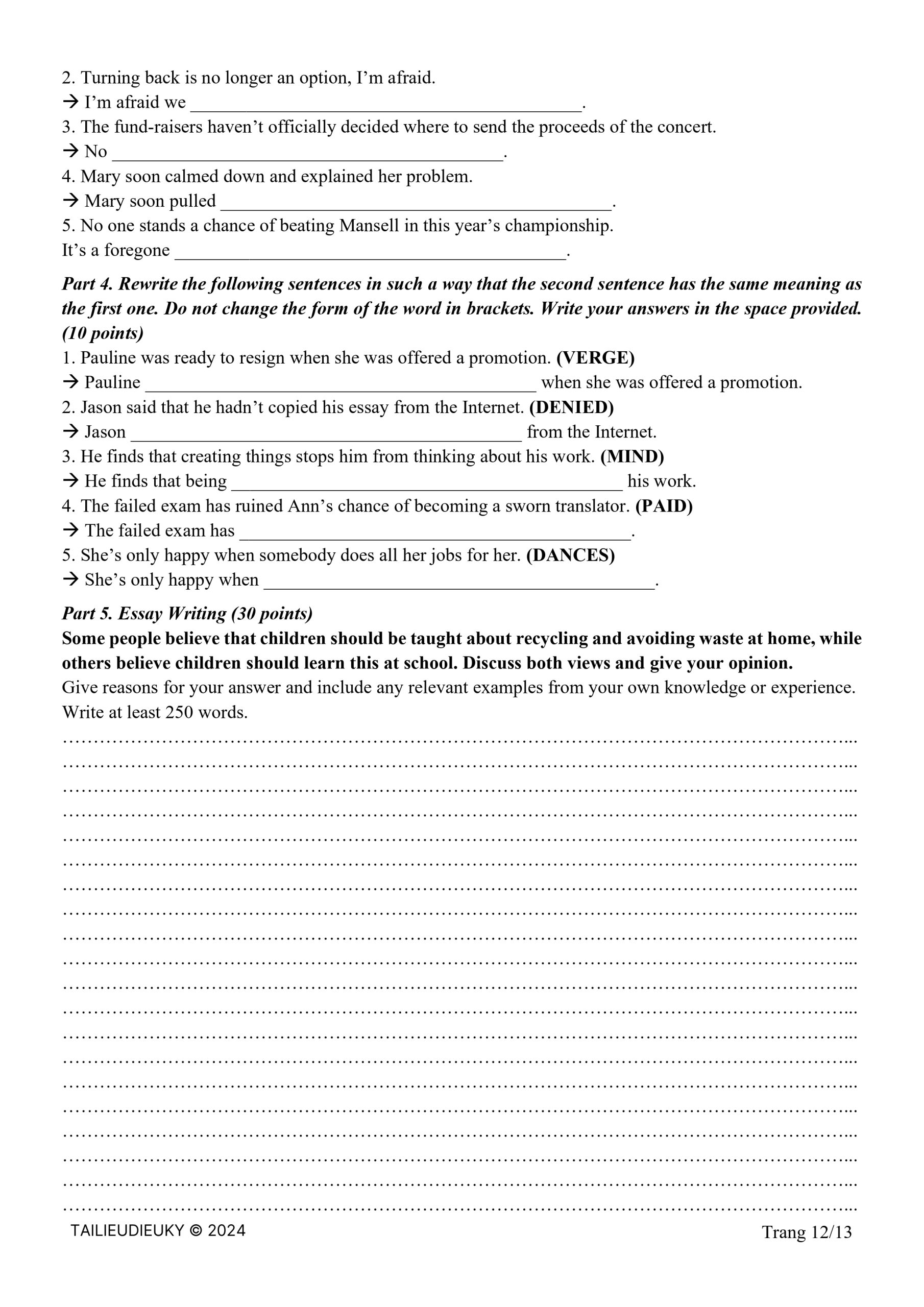
Đề thi HSG Tiếng Anh 12 tỉnh Phú Thọ năm học 2023-2024 - Trang 12
Ngoài tài liệu này, quý thầy cô có thể tham khảo các tài liệu tương tự [Danh mục HSG Tiếng Anh 12] tại website Tài liệu diệu kỳ để tải xuống những tài liệu file word và pdf hữu ích cho việc bồi dưỡng đội tuyển học sinh giỏi THPT.
Trích dẫn nội dung Đề thi HSG Tiếng Anh 12 tỉnh Phú Thọ năm học 2023-2024:
SỞ GIÁO DỤC VÀ ĐÀO TẠO
PHÚ THỌ
ĐỀ THI CHÍNH THỨC
(Đề thi có 13 trang)
KỲ THI CHỌN HỌC SINH GIỎI CẤP TỈNH
LỚP 12 THPT NĂM HỌC 2023-2024
MÔN: TIẾNG ANH
Thời gian làm bài: 180 phút, không kể thời gian phát đề
Họ, tên thí sinh: ..........................................................................
Số báo danh: ...............................................................................
I. LISTENING (20 points)
Part 1. You will hear a teacher phoning a company to arrange an excursion for his students. Listen and complete the notes with NO MORE THAN THREE WORDS OR A NUMBER. Write your answers in the space provided. (10 points)
Company name: Burnham Coaches
Name of Client: (1) _______
Address: Down Language School
Down House
(2) _______
, Brighton
Contact number: (3) _______ to be contacted on 01273 512634
Pick-up time: 7.30
Return time: (4) _______
Purpose of Hire: Visit to Stonehenge and (5) _______
Part 2. You will hear a radio interview in which two people discuss the sport of heli-skiing. Choose the letter A, B, C or D to indicate the best answer to each of the following questions. Write your answers in the space provided. (10 points)
Question 1. Keith feels heli-skiing should not be permitted in the UK because _______.
A. many people have been killed B. heliskiers are too far from help
C. it is banned elsewhere D. weather conditions are unsuitable
Question 2. Helena argues that the locations heli skiers use are _______.
A. prone to avalanches B. very close to resorts
C. not as steep as stairs D. generally fairly safe
Question 3. Keith agrees with Helena that _______.
A. heli-skiing represents an environmental threat B. the dangers at home are just as great
C. other extreme sports are not as risky D. the risk of avalanche is fairly minimal
Question 4. What does Keith describe as difficult to foresee?
A. snow quality B. weather conditions C. wildlife activity D. danger levels
Question 5. Helena is worried that _______.
A. people take unnecessary risks B. danger is subjectively assessed
C. other sports may be banned D. skiing might get a bad name
II. PHONETICS (5 points)
Part 1. Choose the letter A, B, C or D to indicate the word whose stress is placed differently from that of the others. Write your answers in the space provided.
Question 1. A. effect B. struggle C. damage D. effort
Question 2. A. argumentative B. psychological C. contributory D. hypersensitive
Choose the letter A, B, C or D to indicate the word whose underlined part is pronounced differently from that of the rest in each of the following questions. Write your answers in the space provided.
Question 3. A. addressed B. focused C. collapsed D. comprised
Question 4. A. encourage B. energize C. eradicate D. eliminate
Question 5. A. charisma B. resurrect C. prosthetic D. socialize
III. LEXICO-GRAMMAR (50 points)
Part 1. Choose the letter A B C or D to indicate the correct answer to each of the following sentences. Write your answers in the space provided. (30 points)
Question 1. This man is so arrogant that he is completely _______ to all criticism.
A. impervious B. unaware C. regardless D. unconscious
Question 2. Having lost her mother at an early age, Marie felt she had become a mere _______, having to do absolutely everything for her five brothers and sisters.
A. taskmaster B. slavedriver C. workmate D. workhorse
Question 3. The environmental group Greenpeace has done a lot of _______ to change government policies.
A. campaign B. pressure C. power D. force
Question 4. He _______ his head, wondering how he could solve the problem.
A. scratched B. scraped C. screwed D. shaved
Question 5. Keith’s _______ income looks impressive, but once tax and social security contributions are deducted, it’s not so much.
A. full B. grand C. net D. gross
Question 6. When learning a foreign language, keeping well-ordered vocabulary notes is of _______ importance.
A. prominent B. uppermost C. paramount D. dominant
Question 7. He spent his entire life _______ round the world, never settling down anywhere.
A. roaming B. scattering C. roaring D. vesting
Question 8. Once the story _______ the headlines, everyone was talking about it.
A. crashed B. struck C. smashed D. hit
Question 9. I don’t know if Ash would be right for the job; he’s a bit of an unknown _______.
A. quality B. qualification C. quantity D. identity
Question 10. Twenty years serving the business as second in _______ to his father has helped him gain precious experience for his career.
A. authority B. command C. power D. discipline
Question 11. These days, when we hear that someone is off to their yoga class, we never quite know whether the focus is going to be _______ meditation, breathing techniques or actual physical exercises.
A. in B. for C. on D. about
Question 12. I don’t believe you really Jack Nicholson; you’re _______ me on!
A. having B. putting C. giving D. taking
Question 13. She was _______ an array of questions during the interview yesterday.
A. put through B. put over C. put up with D. put forward
Question 14. The actor _______ the last word of the slogan so it would make a lasting impression on the listening audience.
A. got through B. caught up C. took over D. drew out
Question 15. The savage war had _______ this beautiful country waste and left many of its inhabitants homeless.
A. cast B. grown C. laid D. set
Question 16. Having worked his fingers to the _______ for many years, he eventually saw the fruit of his hard work at the age of fifty.
A. end B. edge C. bone D. nail
Question 17. They certainly _______ the mold when they bought out their latest model; it’s totally different from anything else they’ve ever produced.
A. broke B. destroyed C. cracked D. changed
Question 18. The final decision has already been taken, so there’s no use in your _______ the toss.
A. arguing B. disapproving C. dismissing D. quarreling
Question 19. A lot of scorn has been _______ on the Canadian seal hunters for their merciless practices.
A. blamed B. launched C. poured D. fixed
Question 20. I’m not going out with you looking like that. You look like something the _______ dragged in! Brush your hair and put on some clean clothes!
A. pigeon B. cat C. leopard D. rat
Question 21. Remember if you go into that meeting without being prepared with some answers, you will simply be _______.
A. a teacher’s pet B. a sitting duck C. an eager beaver D. a sick animal
Question 22. We suggested it would be quicker to fly, but she _______ and insisted on taking the train.
A. bit her head off B. dug her heels in C. kept her chin up D. stuck her neck on
Question 23. And the questions he asked! He gave me the _______ degree.
A. second B. sixth C. third D. seventh
Question 24. Don’t let insurance companies pull the _______ over your eyes – ask for a list of all the hidden charges.
A. silk B. mask C. ribbon D. wool
Question 25. Newspaper publishers in the States have estimated _______ reads a newspaper every day.
A. nearly 80 percent of the adult population who B. it is nearly 80 percent of the adult population
C. that nearly 80 percent of the adult population who D. that nearly 80 percent of the adult population
Question 26. The competition _______; but you failed to enter it.
A. must have provided you with opportunities B. could have provided you with opportunities
C. should have provided you with opportunities D. may have had provisions for your opportunities
Question 27. The sudden expansion of heated air associated with lightning produces _______ often heard during a storm.
A. thunder is the rumbling sound B. the rumbling sound, thunder is
C. the rumbling sound, thunder, that D. thunder, the rumbling sound
Question 28. _______ the rising population of the industrial nations has not suffered from a major epidemic since the last century.
A. A miracle that B. It is a miracle that
C. That a miracle has been D. Because the miracle
Question 29. Such a savage punishment must be abolished as it is abhorrent _______ a civilized society.
A. with B. for C. to D. in
Question 30. It is imperative that the password of every online account _______ confidential.
A. need keeping B. need to keep C. needs to be kept D. needed keeping
Part 2. Choose the letter A, B, C or D to indicate the word or phrase that is CLOSEST in meaning to the underlined part in each of the following questions. Write your answers in the space provided. (5 points)
Question 1. Jogging has been endorsed by many medical authorities as valuable exercises for the heart and for general physical conditioning.
A. reported B. supported C. criticized D. exaggerated
Question 2. The computer system we use at work has a glitch in it, so we couldn’t do any of our work today. The technician will be in tomorrow to fix it for us.
A. clear signal B. minor malfunction
C. past incident D. small scratch
Question 3. Beth needs to mellow out or she’ll have a heart attack soon.
A. relax more B. eat more C. think more D. drink more
Question 4. Sharon went bananas when she found out that she won a large shopping spree.
A. was depressed B. was overconfident
C. was overly excited D. was sensitive
Question 5. I wanted to go to Spain for my holiday, but just before I left for the airport, I lost my passport. As you can imagine, that really cooked my goose.
A. caused me no problem B. spoiled my plan
C. kept me calm D. worked hard and fast
Part 3. Choose the letter A, B, C or D to indicate the word or phrase that is OPPOSITE in meaning to the underlined part in each of the following questions. Write your answers in the space provided. (5 points)
Question 1. Well, he may not be what one could call a pillar of society, but he’s the right sort of man to get a business going. He’s a good talker.
A. a very important member B. a respectable member
C. an ordinary person D. a favorite person
Question 2. That story Greg told us is pretty lame. He’s always late and he has a million excuses for his behavior.
A. defensive B. adequate C. sensitive D. hurtful
Question 3. When Steven sold the rights to his antique and useful product, he made megabucks.
A. a great asset B. a lot of problem
C. a small amount of money D. a credit limit
Question 4. It’s too much trouble to make yourself look presentable in public, get into something outdoorsy, find the car keys, get the car out of the garage – the list gets longer – and you go off the boil.
A. lose interest B. take more interest
C. become more attractive D. make more friends
Question 5. We renovated our entire house and now we’ve run out of gas so the outdoor patio area will have to wait until we recover.
A. earned a reputation B. gained more momentum
C. lost our money D. made a fortune
Part 4. Choose the letter A, B, C, or D to indicate the underlined part that needs correction in each of the following questions. Write your answers in the space provided. (10 points)
Question 1. On a flip side, the world wide adoption of a couple of languages that have a large number of speakers has led to the death of several less popular languages.
A. On a flip side B. a couple of C. a large number of D. several less popular
Question 2. Influenced by the advancements in behavioral sciences, George Mead argued that interaction with the environment is the key to understand an organism’s self-consciousness.
A. Influenced B. argued C. with the environment D. understand
Question 3. When a child becomes a teenager, he encounters many experiences which are new for him to handle independently. Children of this age are often highly suggested.
A. becomes B. encounters C. handle D. suggested
Question 4. Not surprisingly, parents who show antipathy toward their child are also more likely to be emotionally or physically negligible and abusive.
A. toward B. likely to C. negligible D. abusive
Question 5. Protective gear for firefighters is supposed to be made of inflammable materials so as to eliminate the risk of fires.
A. Protective B. inflammable C. eliminate D. risk
Question 6. Many of color images we see are not composed of all the colors we perceive but are made of three primary colors mixed together.
A. Many of color images B. all the C. are made of D. primary color
Question 7. The American eel is being studied in the hope that information about its migration and feeding habits will be explained why its numbers are decreasing.
A. is being studied B. its migration C. be explained D. are decreasing
Question 8. His face has been on the covers of all the top movies and young magazines over the last few months and has been the subject of countless articles, rumors and showbiz gossip.
A. covers B. young C. countless D. rumors
Question 9. Physicians now believe that even if a person is genetically predisposed to a certain disease, although changes in lifestyle can alter the course of his or her health.
A. believe that B. predisposed C. although changes D. can alter
Question 10. The undersea mountains off the coast of Oregon resemble the Hawaiian Islands, which are volcanoes that grew up the ocean floor to eventually break the surface.
A. undersea B. resemble C. up D. eventually
IV. LANGUAGE FUNCTION (5 points)
Choose the letter A, B, C, or D on your answer sheet to indicate the sentence that best completes each of the following exchanges.
Question 1. Jack and Mary are talking about endangered species.
- Jack: “I’d like to hear your ideas on how to protect vulnerable species.”
- Mary: “_______.”
A. I’d say people’s awareness is very important B. You’re always asking me for advice
C. I like your ideas so much D. These animals are vulnerable
Question 2. Peter and Anny are talking about modern robots.
- Peter: “I believe that modern robots will be more intelligent and replace humans in many dangerous jobs.”
- Anny: “_______”
A. That’s just what I think of course. B. You’re welcome.
C. That’s a good idea. D. Why not? Believe me!
Question 3. Tom and Jane are talking about their plan for the weekend.
- Tom: “I’m going to spend the weekend sitting in front of the television.”
- Jane: “_______.”
A. Oh dear, so you’re in the doghouse again? B. Get a life.
C. No way, you’re pulling my leg! D. Hands off.
Question 4. Linda and Corine are talking about health.
- Linda: “Have you ever been to hospital?”
- Corine: “_______.”
A. No, touch wood B. Poor you
C. Oh, hard luck D. Sure, be my guest
Question 5. Jim and his friend are in a café.
- Jim: “Excuse me, could you take our picture?”
- Waiter: “Sure, give me your camera. OK, _______!”
A. say cheese everyone B. many happy returns
C. spice up your life D. that’ll be the day
V. READING COMPREHENSION (60 points)
Part 1. Read the following passage and mark the letter A, B, C, or D on your answer sheet to indicate the word or phrase that best fits each numbered blank. Write your answers in the space provided. (20 points)
Given the Thumbs Down
When your manager tells you that they are pleased with your work, the least you can expect is a (1) _______ reference when you leave. That, at any rate, is what Wayne Taft thought when he applied for a job as an occupational care worker.
Imagine his surprise then, when he opened a letter that said “Sorry, we can’t (2) _______ you because of your job reference.” “It was very upsetting,” he says. “I was shocked at how cruel people can be. My reference should have been (3) _______.” Mr. Taft, who is unemployed, is still (4) _______ the consequences of his former employer, another home care provider, (5) _______ to supply a positive, or even neutral reference. “I was looking forward to a new job and now I’m on the (6) _______.”
After he received the (7) _______ letter, he resigned himself to pursuing jobs using another past employer as a reference. He was never told why the reference was bad, and he has felt (8) _______ since it happened. But this week, he discovered that under the Data Protection Act, he has the right to request access to the reference from the organization who received it.
Mr. Taft says he intends to (9) _______ the employer that turned him down and demand to see the reference. “I’m so angry, I need to find out what happened and (10) _______ it right,” he adds.
Question 1. A. beneficial B. straight C. decent D. moral
Question 2. A. consider B. regard C. judge D. review
Question 3. A. shining B. glowing C. gleaming D. glistening
Question 4. A. having B. taking C. getting D. suffering
Question 5. A. refusing B. avoiding C. protesting D. disliking
Question 6. A. leisure B. dole C. queue D. home
Question 7. A. rejection B. disapproval C. denial D. dismissal
Question 8. A. accidental B. powerless C. favorable D. decisive
Question 9. A. struggle B. disagree C. dare D. confront
Question 10. A. have B. put C. place D. fix
Part 2. Read the following passage and choose the letter A, B, C, or D to indicate the correct answer to each of the questions. Write your answers in the space provided. (20 points)
Planetary Development
The planet Earth has passed through four-stages of planetary development. All terrestrial planets pass through these same stages to some degree, but some planets evolved further or were affected in different ways.
The Four Stages
The first stage of planetary evolution is differentiation, the separation of material according to density. Earth now has a dense core and a lower-density crust, and that structure must have originated very early in its history. Differentiation would have occurred easily if Earth were molten when it was young. Two sources of energy could have heated Earth. First, heat of formation was released by in-falling material. A meteorite hitting Earth at high velocity converts most of its energy of motion into heat, and the impacts of a large number of meteorites would have released tremendous heat. If Earth formed rapidly, this heat would have accumulated much more rapidly than it could leak away, and Earth was probably molten when it formed. A second source of heat requires more time to develop. The decay of radioactive elements trapped in the Earth releases heat gradually; but, as soon as Earth formed, that heat began to accumulate and helped melt Earth. That would have helped the planet differentiate.
While Earth was still in a molten state, meteorites could leave no trace, but in the second stage in planetary evolution, cratering, the young Earth was battered by meteorites that pulverized the newly forming crust. The largest meteorites blasted out crater basins hundreds of kilometers in diameter. As the solar nebula cleared, the amount of debris decreased, and after the late heavy bombardment, the level of cratering fell to its present low level. Although meteorites still occasionally strike Earth and dig craters, cratering is no longer the dominant influence on Earth’s geology. As you compare other worlds with Earth, you will discover traces of this intense period of cratering, on every old surface in the solar system.
The third stage, flooding, no doubt began while cratering was still intense. The fracturing of the crust and the heating produced by radioactive decay allowed molten rock just below the crust to well up through fissures and flood the deeper basins. You will find such flooded basins with solidified lava flows on other worlds, such as the moon, but all traces of this early lava flooding have been destroyed by later geological activity in Earth’s crust. On Earth, flooding continued as the atmosphere cooled and water fell as rain, filling the deepest basins to produce the first oceans. [A] Notice that on Earth flooding involves both lava and water, a circumstance that we will not find on most worlds. [B]
The fourth stage, slow surface evolution, has continued for the last 3.5 billion years or more. [C] Earth’s surface is constantly changing as sections of crust slide over each other, push up mountains, and shift continents. [D] Almost all traces of the first billion years of Earth’s geology have been destroyed by the active crust and erosion.
Earth as a Planet
All terrestrial planets pass through these four stages, but some have emphasized one stage over another, and some planets have failed to progress fully through the four stages. Earth is a good standard for comparative planetology because every major process on any rocky world in our solar system is represented in some form on Earth.
Nevertheless, Earth is peculiar in two ways. First, it has large amounts of liquid water on its surface. Fully 75 percent of its surface is covered by this liquid; no other planet in our solar system is known to have such extensive liquid water on its surface. Water not only fills the oceans but also evaporates into the atmosphere, forms clouds, and then falls as rain. Water falling on the continents flows downhill to form rivers that flow back to the sea, and in so doing, the water produces intense erosion. You will not see such intense erosion on most worlds. Liquid water is, in fact, a rare material on most planets. Your home planet is special in a second way. Some of the matter on the surface of this world is alive, and a small part of that living matter is aware. No one is sure how the presence of living matter has affected the evolution of Earth, but this process seems to be totally missing from other worlds in our solar system. Furthermore, the thinking part of life on Earth, humankind, is actively altering our planet.
Question 1. Why does the author mention the “Earth” in paragraph 1?
A. To explain the stages in planetary development for the Earth in detail.
B. To contrast the evolution of the Earth with that of other planets.
C. To demonstrate that the Earth passed through similar stages to those of most planets.
D. To give an example of exploration of the terrestrial planets.
Question 2. Which of the sentences below best expresses the information in the highlighted statement in the passage?
A. The Earth may have been liquid because the heat collected faster than it dissipated if the formation took place quickly.
B. Because of the rapid formation of the Earth, the crust took a long time to cool before it became a solid.
C. The liquid core of the Earth was created when the planet first formed because the heat was so high and there was little cooling.
D. The cooling caused the Earth to form much more quickly as it met with the intense heat of the new planet.
Question 3. The word “pulverized” in the passage is closest in meaning to _______.
A. melted into liquid B. broken into small parts
C. frozen very hard D. washed very clean
Question 4. When can be inferred about radioactive decay in paragraph 4?
A. It floods the planet’s crust. B. It generates intense heat.
C. It is an important stage. D. It is revealed by later activity.
Question 5. According to paragraph 4, how were the oceans formed?
A. Ice removed depressions in the Earth. B. Rain filled the basins.
C. Earthquakes shifted the continents. D. Molten rock and lava flooded the basins.
Question 6. According to the passage, which stage occurs after cratering?
A. Flooding B. Eruption C. Evaporation D. Erosion
Question 7. What is the author’s opinion of life on other planets?
A. The author knows exactly life is present on other planets.
B. The author does not support life on other planets.
C. The author is certain that no life exists on any planet except Earth.
D. The author thinks that humans also live on other planets.
Question 8. Look at the four squares [ ■ ] that show where the following sentence could be inserted in the passage.
“At the same time, moving air and water erode the surface and wear away geological features.”
A. [A] B. [B] C. [C] D. [D]
Question 9. The word “peculiar” in the passage is closest in meaning to _______.
A. ordinary B. abnormal C. unusual D. eccentric
Question 10. All of the following are reasons why the Earth is a good model of planetary development for purposes of comparison with other planets EXCEPT _______.
A. The Earth has gone through all four stages of planetary evolution
B. Life on Earth has affected the evolution in a number of important ways
C. All of the fundamental processes on terrestrial planets have occurred on Earth
D. There is evidence of extensive cratering both on Earth and on all other planets
Part 3. Read the text and do the tasks that follow. Write your answers in the space provided. (20 points)
The Reading Passage has eight paragraphs A-H.
For questions 1-6, choose the most suitable heading below for each paragraph from the list of headings below.
List of headings
i Amazing results from a project
ii New religious ceremonies
iii Community art centres
iv Early painting techniques and marketing systems
v Mythology and history combined
vi The increasing acclaim for Aboriginal art
vii Belief in continuity
viii Oppression of a minority people
1. Paragraph A _______
2. Paragraph B _______
3. Paragraph C _______
4. Paragraph D _______
5. Paragraph E _______
6. Paragraph F _______
Painters of time
A The works of Aboriginal artists are now much in demand throughout the world, and not just in Australia, where they are already fully recognised: the National Museum of Australia, which opened in Canberra in 2001, designated 40% of its exhibition space to works by Aborigines. In Europe their art is being exhibited at a museum in Lyon. France, while the future Quai Branly museum in Paris which will be devoted to arts and civilisations of Africa. Asia, Oceania and the Americas plans to commission frescoes by artists from Australia.
B Their artistic movement began about 30 years ago. but its roots go back to time immemorial. All the works refer to the founding myth of the Aboriginal culture, ‘the Dreaming’. That internal geography, which is rendered with a brush and colours, is also the expression of the Aborigines’ long quest to regain the land which was stolen from them when Europeans arrived in the nineteenth century. ‘Painting is nothing without history.’ says one such artist. Michael Nelson Tjakamarra.
C There arc now fewer than 400.000 Aborigines living in Australia. They have been swamped by the country’s 17.5 million immigrants. These original ‘natives’ have been living in Australia for 50.000 years, but they were undoubtedly maltreated by the newcomers. Driven back to the most barren lands or crammed into slums on the outskirts of cities, the Aborigines were subjected to a policy of ‘assimilation’, which involved kidnapping children to make them better ‘integrated’ into European society, and herding the nomadic Aborigines by force into settled communities.
D It was in one such community, Papunya, near Alice Springs, in the central desert, that Aboriginal painting first came into its own. In 1971, a white schoolteacher. Geoffrey Bardon, suggested to a group of Aborigines that they should decorate the school walls with ritual motifs. so as to pass on to the younger generation the myths that were starting to fade from their collective memory, lie gave them brushes, colours and surfaces to paint on cardboard and canvases. He was astounded by the result. But their art did not come like a bolt from the blue: for thousands of years Aborigines had been ‘painting’ on the ground using sands of different colours, and on rock faces. They had also been decorating their bodies for ceremonial purposes. So there existed a formal vocabulary.
E This had already been noted by Europeans. In the early twentieth century. Aboriginal communities brought together by missionaries in northern Australia had been encouraged to reproduce on tree bark the motifs found on rock faces. Artists turned out a steady stream of works, supported by the churches, which helped to sell them to the public, and between 1950 and I960 Aboriginal paintings began to reach overseas museums. Painting on bark persisted in the north, whereas the communities in the central desert increasingly used acrylic paint, and elsewhere in Western Australia women explored the possibilities of wax painting and dyeing processes, known as ‘batik’.
F What Aborigines depict are always elements of the Dreaming, the collective history that each community is both part of and guardian of. I he Dreaming is the story of their origins, of their ‘Great Ancestors’, who passed on their knowledge, their art and their skills (hunting, medicine, painting, music and dance) to man. ‘The Dreaming is not synonymous with the moment when the world was created.’ says Stephane Jacob, one of the organisers of the Lyon exhibition. ‘For Aborigines, that moment has never ceased to exist. It is perpetuated by the cycle of the seasons and the religious ceremonies which the Aborigines organise. Indeed the aim of those ceremonies is also to ensure the permanence of that golden age. The central function of Aboriginal painting, even in its contemporary manifestations, is to guarantee the survival of this world. The Dreaming is both past, present and future.’
G Each work is created individually, with a form peculiar to each artist, but it is created within and on behalf of a community who must approve it. An artist cannot use a ‘dream’ that does not belong to his or her community, since each community is the owner of its dreams, just as it is anchored to a territory marked out by its ancestors, so each painting can be interpreted as a kind of spiritual road map for that community.
H Nowadays, each community is organised as a cooperative and draws on the services of an art adviser, a government-employed agent who provides the artists with materials, deals with galleries and museums and redistributes the proceeds from sales among the artists.
Today, Aboriginal painting has become a great success. Some works sell for more than $25,000, and exceptional items may fetch as much as $180,000 in Australia.
‘By exporting their paintings as though they were surfaces of their territory, by accompanying them to the temples of western art. the Aborigines have redrawn the map of their country, into whose depths they were exiled,* says Yves Le Fur. of the Quai Branlv museum. ‘Masterpieces have been created. Their undeniable power prompts a dialogue that has proved all too rare in the history of contacts between the two cultures’.
Complete the flow chart below.
For questions 7-10, complete the summary below. Use NO MORE THAN THREE WORDS from the passage for each answer.
For (7) _______, Aborigines produced ground and rock paintings.
Early twentieth century: churches first promoted the use of (8) _______ for paintings.
Mid-twentieth century: Aboriginal paintings were seen in (9) _______.
Early 1970s: Aboriginal painted traditional patterns on (10) _______ in one commodity.
VI. WRITING (60 points)
Part 1. Choose the letter A, B, C, or D on your answer sheet to indicate the sentence that has the same meaning as the sentence provided. Write your answers in the space provided. (5 points)
Question 1. There was moderate fluctuation in the availability of seasonal produce.
A. The availability of seasonal produce experienced a stable period.
B. The availability of seasonal produce is recorded levelling off.
C. The availability of seasonal produce hardly moved up and down.
D. The availability of seasonal produce went through a period of erratic.
Question 2. Many immigrants do not want their children to suffer from not speaking dominant language well, as they did.
A. Many immigrants do not want their children to speak dominant language as well as they did.
B. Many immigrants want their children to speak dominant language better than they did.
C. Many immigrants want their children to speak dominant language as well as they did.
D. Many immigrants want to speak dominant language as well as their children can.
Question 3. He was about to do something when his mother suddenly shouted out.
A. He was doing something when his mother suddenly shouted out.
B. He refused to do something about his mother suddenly shouting out.
C. He was on the point of doing something when his mother suddenly shouted out.
D. His mother’s sudden shouting out helped him to do something.
Question 4. My eldest sister started working as a freelance journalist as soon as she graduated from university.
A. No sooner had my eldest sister started working as a freelance journalist than she graduated from university.
B. Hardly had my eldest sister started working as a freelance journalist when she graduated from university.
C. No sooner had my eldest sister graduated from university than she started working as a freelance journalist.
D. After my eldest sister graduated from university, she had started working as a freelance journalist.
Question 5. They couldn’t have fed so many people at the soup kitchen without the food donations from both individual citizens and local businesses.
A. The soup kitchen managed to cook plenty of food without having any donations from either local shops or residents.
B. The soup kitchen could have served many more people if they had received some donations from a private business or some local individuals.
C. The food donated by local businesses and residents was what allowed them to feed such a large number of people at the soup kitchen.
D. Both the business community and local residents were willing to donate food to the soup kitchen they were organizing.
Part 2. Choose the letter A, B, C, or D on your answer sheet to indicate the sentence that best combines each pair of sentences in the following questions. Write your answers in the space provided. (5 points)
Question 1. Kate completed her higher education. She then decided to travel the world before getting a job.
A. Without completing her higher education, Kate decided to travel the world before getting a job.
B. Given that Kate decided to travel the world before getting a job, she completed her higher education.
C. Having completed her higher education, Kate decided to travel the world before getting a job.
D. Kate had scarcely travelled the world before getting a job when she completed her higher education.
Question 2. Some economists argue that new technology causes unemployment. Others feel that it allows more jobs to be created.
A. Some economists argue that new technology causes unemployment, so others feel that it allows more jobs to be created.
B. Arguing that new technology causes unemployment, other economists feel that it allows more jobs to be created.
C. Besides the argument that new technology causes unemployment, some economists feel that it allows more jobs to be created.
D. Some economists argue that new technology causes unemployment whereas others feel that it allows more jobs to be created.
Question 3. People look down on his invention at first. It enjoyed, however, an unparalleled popularity later.
A. His invention, although treated with disdain in its early years, however, an unparalleled popularity later.
B. When his invention became extremely popular, people no longer looked down on it.
C. His invention was treated equally when it first appeared, but it gradually gained its popularity afterwards.
D. The unparalleled popularity of his invention was an inevitable result as it was highly thought of in its early years.
Question 4. He was successful because he was determined to pursue personal goals. He was not talented.
A. His success lay in his natural ability, not in his determination to pursue personal goals.
B. In addition to his determination, his talent ensured his success in pursuing his goals.
C. His determination to pursue personal goals made him successful and talented.
D. It was his determination to pursue personal goals, not talent, that contributed to his success.
Question 5. We are not going to select the ruling party. We are not going to select the opposition party either.
A. We are going to select neither the ruling party nor the opposition party in the upcoming election.
B. We are not going to select neither the ruling party nor the opposition party in the upcoming election
C. We are going to select both the ruling party and the opposition party in the upcoming election.
D. We are going to select either the ruling party or the opposition party in the upcoming election.
Part 3. Finish each of the following sentences in such a way that it means the same as the original one. Write your answers in the space provided. (10 points)
1. It was only his full cooperation that led to the burglar’s arrest.
=> Had he not __________________________________________.
2. Turning back is no longer an option, I’m afraid.
=> I’m afraid we __________________________________________.
3. The fund-raisers haven’t officially decided where to send the proceeds of the concert.
=> No __________________________________________.
4. Mary soon calmed down and explained her problem.
=> Mary soon pulled __________________________________________.
5. No one stands a chance of beating Mansell in this year’s championship.
It’s a foregone __________________________________________.
Part 4. Rewrite the following sentences in such a way that the second sentence has the same meaning as the first one. Do not change the form of the word in brackets. Write your answers in the space provided. (10 points)
1. Pauline was ready to resign when she was offered a promotion. (VERGE)
=> Pauline __________________________________________ when she was offered a promotion.
2. Jason said that he hadn’t copied his essay from the Internet. (DENIED)
=> Jason __________________________________________ from the Internet.
3. He finds that creating things stops him from thinking about his work. (MIND)
=> He finds that being __________________________________________ his work.
4. The failed exam has ruined Ann’s chance of becoming a sworn translator. (PAID)
=> The failed exam has __________________________________________.
5. She’s only happy when somebody does all her jobs for her. (DANCES)
=> She’s only happy when __________________________________________.
Part 5. Essay Writing (30 points)
Some people believe that children should be taught about recycling and avoiding waste at home, while others believe children should learn this at school. Discuss both views and give your opinion.
Give reasons for your answer and include any relevant examples from your own knowledge or experience.
Write at least 250 words.
---------- HẾT ----------
